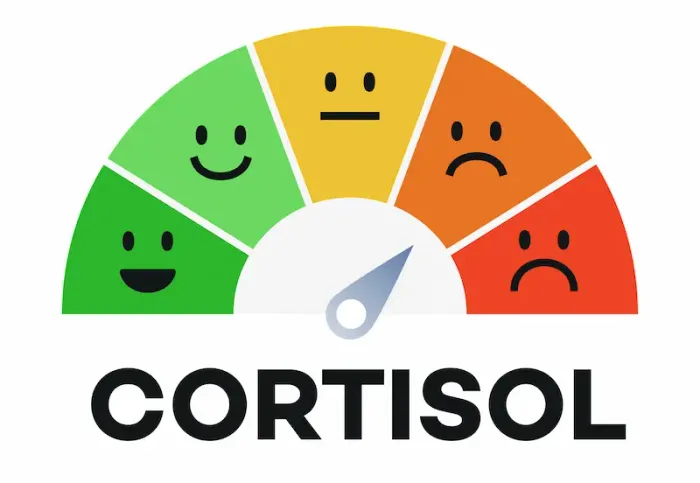Understanding Stress and High Cortisol Levels
Understand how chronic stress raises cortisol levels and affects your health. Learn the symptoms, causes, and risks of high cortisol, plus practical lifestyle tips to manage stress and restore balance.


Stress is a natural part of life, but when it becomes chronic, it can lead to high cortisol levels, which may harm your health. Cortisol, often called the "stress hormone," plays a vital role in regulating metabolism, blood pressure, and immune function. However, too much cortisol over time can lead to serious health problems.
In this article, we’ll explore what stress and high cortisol levels mean, their symptoms, causes, and how they affect your body. We’ll also share practical tips to manage stress and keep cortisol levels in check.
What Is Cortisol?
Cortisol is a hormone produced by your adrenal glands (small glands located on top of your kidneys). It helps your body:
• Respond to stress
• Control blood sugar levels
• Regulate metabolism
• Reduce inflammation
• Maintain blood pressure
In short bursts, cortisol is beneficial, it gives you energy to handle challenges. However, when stress becomes long-term, cortisol stays elevated, leading to health issues.
Symptoms of High Cortisol Levels
If your body is constantly under stress, you may experience:
• Fatigue – Feeling tired even after a full night’s sleep
• Weight gain – Especially around the abdomen and face
• High blood pressure – Due to prolonged stress response
• Mood swings – Increased anxiety, irritability, or depression
• Weakened immune system – Frequent colds or infections
• Digestive problems – Bloating, indigestion, or changes in appetite
• Sleep disturbances – Trouble falling or staying asleep
• Brain fog – Difficulty concentrating or remembering things
What Causes High Cortisol?
Several factors can lead to elevated cortisol levels:
1. Chronic Stress – Work pressure, financial worries, or personal conflicts.
2. Poor Sleep – Not getting enough rest disrupts hormone balance.
3. Unhealthy Diet – High sugar, caffeine, and processed foods can spike cortisol.
4. Lack of Exercise – Sedentary lifestyles contribute to stress buildup.
5. Medical Conditions – Such as Cushing’s syndrome or adrenal tumors (rare).
How High Cortisol Affects Your Health
Long-term high cortisol can lead to:
• Weight Gain & Obesity – Cortisol increases appetite, especially for sugary and fatty foods.
• Heart Disease – Elevated blood pressure and cholesterol levels raise heart risks.
• Diabetes Risk – Cortisol makes it harder for insulin to work properly.
• Weakened Immunity – Higher susceptibility to infections.
• Bone & Muscle Loss – Cortisol reduces bone density and muscle mass.
• Mental Health Issues – Anxiety, depression, and memory problems.
Consult Top Specialist
How to Manage Stress & Lower Cortisol
The good news is that you can take steps to reduce stress and balance cortisol levels naturally.
1. Practice Relaxation Techniques
• Deep Breathing – Slow, deep breaths help calm the nervous system.
• Meditation & Mindfulness – Just 10 minutes a day can reduce stress.
• Yoga or Tai Chi – Gentle movements improve relaxation.
2. Get Quality Sleep
• Stick to a regular sleep schedule.
• Avoid screens before bedtime.
• Keep your bedroom dark and cool.
3. Eat a Balanced Diet
• Reduce caffeine & sugar – They can spike cortisol.
• Eat more whole foods – Fruits, vegetables, lean proteins, and healthy fats.
• Stay hydrated – Dehydration can increase stress responses.
4. Exercise Regularly
• Moderate exercise (like walking, swimming) lowers cortisol.
• Avoid excessive high-intensity workouts if already stressed.
5. Stay Connected
• Spend time with loved ones—social support reduces stress.
• Talk to a therapist if needed.
6. Take Breaks & Prioritize Self-Care
• Take short breaks during work.
• Engage in hobbies you enjoy.
When to Seek Medical Help
If you experience severe symptoms like:
• Unexplained weight gain
• Extreme fatigue
• High blood pressure
• Persistent mood swings
It may be time to check your cortisol levels. A simple blood or saliva test can help diagnose hormonal imbalances.
Book a Consultation Today
If stress is affecting your daily life, consider speaking with a doctor. You can schedule a consultation or cortisol test through Apollo 24|7 for expert guidance.
Get Your Symptoms Checked now
Final Thoughts
Stress is unavoidable, but managing it effectively can prevent long-term health problems. By making small lifestyle changes; like better sleep, a balanced diet, and relaxation techniques, you can keep cortisol levels in check and improve overall well-being.
Would you like to consult a specialist? Book an appointment now on Apollo 24|7 for personalized care.
Consult Top Specialist
Consult Top Specialist

Dr. Mainak Baksi
General Practitioner
13 Years • MBBS , MD (MPH)
Howrah
Mainak Baksi Clinic, Howrah
(50+ Patients)

Dr. Mohammed Kamran
General Practitioner
5 Years • MBBS, FIDM
Nashik
Apollo 24|7 Clinic - Maharashtra, Nashik

Dr. Vasanthasree Nair
General Practitioner
15 Years • MBBS
Angamaly
Apollo 24|7 Clinic - Kerala, Angamaly
(500+ Patients)

Dr. Jawwad Mohammed Kaleem
General Practitioner
4 Years • MBBS
Hyderabad
Apollo 24|7 Clinic, Hyderabad

Dr. Rajib Ghose
General Physician/ Internal Medicine Specialist
25 Years • MBBS
East Midnapore
VIVEKANANDA SEBA SADAN, East Midnapore
Consult Top Specialist

Dr. Mainak Baksi
General Practitioner
13 Years • MBBS , MD (MPH)
Howrah
Mainak Baksi Clinic, Howrah
(50+ Patients)

Dr. Mohammed Kamran
General Practitioner
5 Years • MBBS, FIDM
Nashik
Apollo 24|7 Clinic - Maharashtra, Nashik

Dr. Vasanthasree Nair
General Practitioner
15 Years • MBBS
Angamaly
Apollo 24|7 Clinic - Kerala, Angamaly
(500+ Patients)

Dr. Jawwad Mohammed Kaleem
General Practitioner
4 Years • MBBS
Hyderabad
Apollo 24|7 Clinic, Hyderabad

Dr. Rajib Ghose
General Physician/ Internal Medicine Specialist
25 Years • MBBS
East Midnapore
VIVEKANANDA SEBA SADAN, East Midnapore
Get Your Symptoms Checked now
₹869(₹2173)60% off





